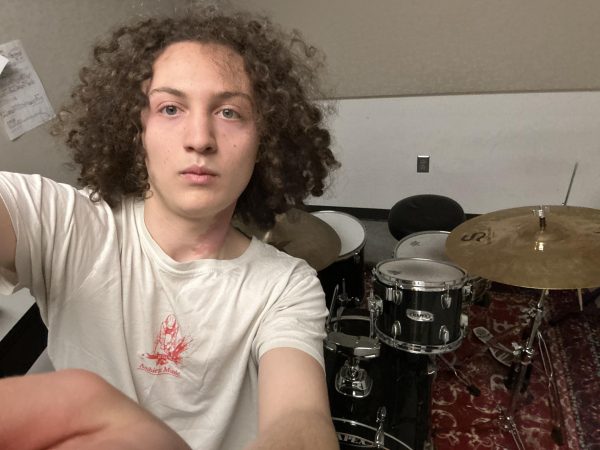Matthew Allaire ’27, a tech reform activist, student, avid meditator and Data Fellow for Career Exploration at Macalester, appeared on the 9.5 million subscriber YouTube channel Jubilee in an episode of their “Middle Ground” series, released on Nov. 17, 2024.
Allaire is a member of the non-profit organization LOG OFF which seeks to empower youth to “tackle the complexities of social media and its impact on younger generations,” according to its website. However, his interest and philosophy toward social media reform are rooted in personal experience.
The year was 2020 and Allaire had just broken a two-year addiction to video games. In those two years of addiction, Allaire observed a toxic community where he described “toxic attitudes towards women and ethnic minorities … are commonplace.”
But what inspired Allaire to finally leave this harmful community? The answer lay in a documentary released the same year. “The Social Dilemma,” directed by Jeff Orlowski (2020), is an American documentary that reports on the negative aspects of social media and its various algorithms, which the film deems dangerous.
“As a young person who had observed a lot of my friends struggling with anxiety and depression, struggling with suicide and self harm, struggling with a voracious over-competitiveness that led to bad mental health outcomes,” Allaire said, “what the documentary did for me was really tie [these struggles] all together as being symptoms of a single generator function, which was the … surveillance- and advertising-based business model of social media platforms.”
Ever since then, Allaire has been involved in tech reform advocacy. Whether on the youth empowerment side with LOG OFF or lobbying various legislators for specific bills with the organization Design It for Us, a youth-led coalition of advocates for social media reform who led a successful campaign effort in 2022 that led to the unanimous passing of California’s Age Appropriate Design Code Act.
Now, Allaire’s philosophy on social media and tech reform is as follows:
“If we can trigger fight-or-flight in somebody’s nervous system, you’re gonna get them to give you their attention,” Allaire said. “So all that is to say, I got involved with tech reform as what I viewed then and still view now to be the single, highest priority issue for society that’s also getting the least amount of attention.
“I think most people would acknowledge that their relationship with their smartphone is somewhat problematic in some way, whether it’s time spent, whether it’s what you’re doing, maybe it’s dependency.”
On July 19th, 2024, Allaire got an email from LOG OFF’s director of communications saying that Jubilee was planning on filming a “Middle Ground” video where teenagers would discuss their pro- or anti-social media views. They asked Allaire to apply and represent their organization. Three days later, Allaire submitted his application, which was followed by a 45-minute long Zoom interview with Jubilee. Soon after his interview, Jubilee told him he had been selected.
Allaire flew to Los Angeles in August. On the day of the shoot, he drove from his accommodation to Jubilee’s studio. Waiting for the shoot to start, he journaled and meditated until everyone was ready. The crew made sure to separate everyone so participants wouldn’t see each other until they started shooting.
The first statement the mediator read out was, “I spend more than five hours on social media a day.” Those who felt that this statement applied to them moved to the front, while others stayed in the back, including Allaire. When asked to present his average daily screen time though, his phone showed eight hours and 51 minutes. This was due to the fact that he has a Macbook and the screen times of both devices showed together. In reality, Allaire spends “two and a half hours a day” on his phone, which he says is “on the lower end for [his] generation.”
When discussing a potential age requirement for being able to open an account on social media, Allaire argued in the video that we are “in the midst of the largest teen youth mental health crisis in decades” and that the large number of suicides amongst minors is partially due to unlimited access to social media. He suggested only allowing people older than 16 years of age to create a social media account.
Gavin Magnus, a fellow participant and internet celebrity with 2.4 million followers, disagreed.
“Personally, I find [an age requirement of 16] a little bit baffling,” Magnus said. “Coming from the position I am in … trying to wrap my head around that the age you can operate a motor vehicle [would be] the same as [to] be on social media. I just feel like that’s so unrealistic.”
According to Allaire, the complete debate took about two hours and was cut into an approximately 40 minute long video.
Reflecting, Allaire didn’t think that the video was entirely representative of how the conversation between the two sides actually went. Without the editing, the participants did not disagree as dramatically.
Allaire noted the irony of what he stands for and the way he is promoting it.
“The irony here is that we’re on this Jubilee episode talking about the harms on social media to help you communicate.” Allaire said. “And then Jubilee has to go put in a video on YouTube … that was a little frustrating, but at the same time, if this is the world we’re living in, this is how you have to play.”
Allaire urged his peers to be cautious in how they use social media. He noted that tech reform activists are often people with traumatic experiences related to the internet.
“You don’t have to have had some element of your life ruined by social media to view this as an area of considerable concern.” Allaire said. “I would ask that anyone who’s a heavy user of these products be a critical consumer.”







